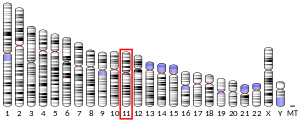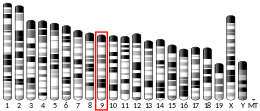FAT atypical cadherin 3 is a protein that in humans is encoded by the FAT3 gene.[5]
Further reading
- Berndt JD, Aoyagi A, Yang P, Anastas JN, Tang L, Moon RT (September 2011). "Mindbomb 1, an E3 ubiquitin ligase, forms a complex with RYK to activate Wnt/β-catenin signaling". The Journal of Cell Biology. 194 (5): 737–50. doi:10.1083/jcb.201107021. PMC 3171123. PMID 21875946.
- Zheng JS, Arnett DK, Lee YC, Shen J, Parnell LD, Smith CE, Richardson K, Li D, Borecki IB, Ordovás JM, Lai CQ (2013). "Genome-wide contribution of genotype by environment interaction to variation of diabetes-related traits". PLOS One. 8 (10): e77442. doi:10.1371/journal.pone.0077442. PMC 3810463. PMID 24204828.
- Mitsui K, Nakajima D, Ohara O, Nakayama M (February 2002). "Mammalian fat3: a large protein that contains multiple cadherin and EGF-like motifs". Biochemical and Biophysical Research Communications. 290 (4): 1260–6. doi:10.1006/bbrc.2002.6338. PMID 11811999.
- Wu Q (April 2005). "Comparative genomics and diversifying selection of the clustered vertebrate protocadherin genes". Genetics. 169 (4): 2179–88. doi:10.1534/genetics.104.037606. PMC 1449604. PMID 15744052.



